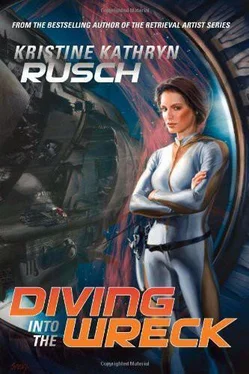I think the knife is dangerous—he could poke a hole in his environmental suit—but I also know I can’t convince him to give the knife up. It’s saved his life more than once—the last time when he was solo diving a wreck he discovered and got ambushed by three claim jumpers.
He killed them, finished the dive, and then reported his actions. I was on Longbow when he went up on charges and ably defended himself with holo-cordings, audio, and not a little bit of personal outrage.
Karl is the only member of the team who worries me. If I can’t keep him under control, he might take over the dive.
And there’s nothing I hate more than losing control of a mission.
Except losing a member of my team.
~ * ~
We approach the wreck in stealth mode: lights and communications array off, sensors on alert for any other working ship in the vicinity. I’m the only one in the cockpit of the Nobody’s Business. I’m the only one with the exact coordinates.
The rest of the team sits in the lounge, their gear in cargo. I personally searched each one of them before sticking them to their chairs. No one, but no one, knows where the wreck is except me. That is our agreement.
They hold to it or else.
We’re six days from Longbow Station, but it took us ten to get here. Misdirection again, although I’d only planned on two days working my way through an asteroid belt around Beta Six. I ended up taking three, trying to get rid of a bottom-feeder that tracked us, hoping to learn where we’re diving.
Hoping for loot.
After I’m sure I have lost every chance of being tracked, I let the Business slide into a position far enough from the wreck that we’re out of normal scanner range. We can’t eyeball the wreck either. We match the wreck’s speed, but do little else.
I use this precaution on all of my valuable wreck dives. If my ship’s energy signals are caught on someone else’s scans, they won’t pick up the faint energy signal of the wreck. I have a half dozen cover stories ready, depending on who might spot us. I’ll tell them lies about why we’re in this area of space. I’ll tell them anything I can to get rid of them.
But most of all, I hope no one will stumble upon us while we dive the wreck.
Taking this precaution means we need transport to and from the wreck. That’s the only drawback of this kind of secrecy.
First mission out, I’m ferry captain—a role I hate, but one I have to play. We’re using the skip instead of the Business. The skip is designed for short trips. It has a main room that melds into the pilot’s area, a cargo bay, a galley kitchen, and a bathroom. It also has two escape pods in case something goes wrong. The pods only fit one person each—a design flaw, since the skip itself holds four.
The skip is also designed to travel anonymously. I had the name and logo removed right after I bought it. Not even the pods have any identifying features. I don’t want to be easily identified, particularly when I’m diving an unknown wreck.
On this trip, there’s only three of us—me, Turtle, and Karl. Usually we team-dive wrecks, but this deep and this early, I need two different kinds of players. Turtle can dive anything, and Karl can kill anything. I can fly anything.
We’re set.
The process we’re about to embark on gets its name from the dangers: in olden days, wreck diving was called space diving to differentiate it from the planetside practice of diving into the oceans.
We don’t face water here—we don’t have its weight or its unusual properties, particularly at huge depths. We have other elements to concern us: no gravity, no oxygen, extreme cold.
And greed.
My biggest problem is that I’m land-born, something I don’t confess to often. I spent the last forty years of my life trying to forget that my feet were once stuck to a planet’s surface by real gravity. I even came to prolonged zero-g late: fifteen years old, already landlocked. My first instructors told me I’d never unlearn the thinking real atmosphere ingrains into the body.
They were mostly right; land pollutes me, takes out an edge that the space-raised come to naturally. I have to consciously choose to go into the deep and dark; the space-raised glide in like it’s mother’s milk. But if I compare myself to the landlocked, I’m a spacer of the first order, someone who understands vacuum like most understand air.
But because I’m the least able diver on the skip, I’ll stay on board, even though I’m the one who discovered the Dignity Vessel. I trust Karl and Turtle; besides, they’ll record everything they see.
It will almost be as if I’ve dived with them.
Almost.
I fly the skip with the portals unshielded. It looks like we’re inside a piece of black glass moving through open space. Turtle paces most of the way, walking back to front to back again, peering through the portals, hoping to be the first to see the wreck.
She’s even thinner than she was when I first met her decades ago. Her bones look fragile enough to snap. Her skin is rough from the chemicals some suits are contaminated with and from weird exposures from bad dives. Her fingers are long, birdlike.
She no longer looks like the woman we nicknamed Turtle. Then her head had been the smallest thing about her. When she put on an environmental suit, it seemed like she put on a protective shell.
In those days, I was convinced she could slide her helmeted head inside her suit and pretend to be a rock, just like a real turtle.
Now her head seems large against her skeletal frame. Middle age has not treated her well, although she is as strong and healthy as ever.
Karl monitors the instruments as if he’s flying the skip instead of me. If I hadn’t worked with him before, I’d be freaked. I’m not; I know he’s watching for unusuals, whatever comes our way.
Karl is the opposite of Turtle. He looks as sturdy as she seems fragile. He has a broad open face and close-cut blond hair.
Everything about him seems efficient and strong, as powerful as that knife he carries everywhere he goes.
The wreck looms ahead of us—a megaship, from the days when size equaled power. Still, it seems small in the vastness, barely a blip on the front of my sensors.
Turtle bounces past. She’s fighting the grav that I left on for me—that landlocked thing again—and she’s so nervous, someone who doesn’t know her would think she’s on something.
“What the hell is it?” she asks. “Old Empire?”
“Older.” Karl is bent at the waist, looking courtly as he studies the instruments. He prefers readouts to eyeballing things; he trusts equipment more than he trusts himself.
“There can’t be anything older out here,” Turtle says.
“‘Can’t’ is relative,” Karl says.
I let them tough it out. I’m not telling them what I know. The skip slows, and shuts down. I’m easing in, leaving no trail.
“It’s gonna take more than six of us to dive that puppy,” Turtle says. “Either that, or we’ll spend the rest of our lives here.”
“As old as that thing is,” Karl says, “it’s probably been plundered and replundered.”
“We’re not here for the loot.” I speak softly, reminding them it’s a historical mission.
Karl turns his angular face toward me. In the dim light of the instrument panel, his gray eyes look silver. “You know what this is?”
I don’t answer. I’m not going to lie about something as important as this, so I can’t make a denial. But I’m not going to confirm either. Confirming will only lead to more questions, which is something I don’t want just yet. I need them to make their own minds up about this find.
Читать дальше










